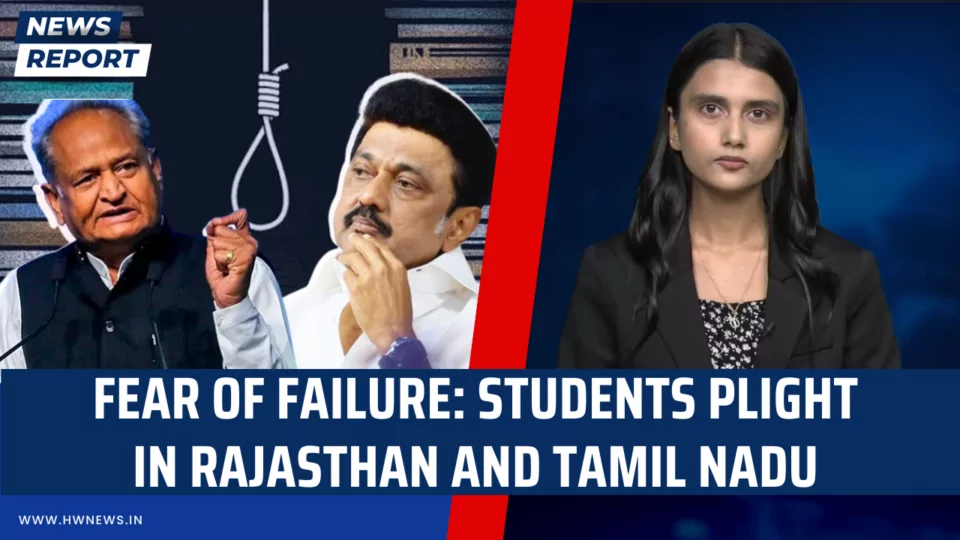In the states of Rajasthan and Tamil Nadu, there has been a noticeable increase in student suicides, which are attributed to the mounting pressures of NEET and JEE exams. Fueled by a strong desire for success, students dedicate themselves entirely to their studies, only to find themselves overwhelmed by depression when faced with failure. The differing responses of the Chief Ministers in these two states shed light on the severity of the issue. These varying approaches highlight the ongoing debate regarding the importance of ensuring the mental well-being of young minds amidst the relentless pursuit of academic excellence. Rajasthan’s Chief Minister, Ashok Gehlot, has taken a proactive stance by openly expressing his concerns about the growing instances of student suicide, particularly in Kota. In response, he has instructed officials to establish a committee aimed at providing suggestions for its prevention. Gehlot emphatically stated, “”I have announced the formation of a committee, and it will submit its report within 15 days.”” Speaking at a review meeting centered around suicide cases among IIT and NEET aspirants in the coaching hub, Gehlot emphasized the significant burden placed on students in classes 9 and 10. He candidly remarked that enrolling students in these classes in coaching institutes was tantamount to a crime, and he also attributed partial responsibility to parents. Gehlot’s approach seeks to address the systemic issues that contribute to these tragic incidents and aims to identify actionable solutions. Conversely, the response from Tamil Nadu’s Chief Minister takes an entirely different path. In an attempt to address the issue at its core, he boldly announced the discontinuation of the NEET exam altogether. He used the opportunity to uplift and encourage students, urging them to face life with self-assurance rather than harboring thoughts of self-harm. This approach stems from direct action and empathy, focusing on empowering the students while challenging the very source of their distress. This stark contrast in response strategies highlights the essence of leadership within an ideal democratic framework. Effective leaders are expected to confront challenges by prioritizing solutions over the blame game. M.K. Stalin’s approach, which involves delving into the root causes of the issue, exemplifies a commitment to comprehensively understanding the problem. By addressing these underlying factors, he aims to catalyze meaningful change and prevent future recurrences. In contrast, Ashok Gehlot’s response, which revolves around attributing blame to parents and external factors, raises pertinent questions about the effectiveness of such an approach. In a democratic society, leaders shoulder the responsibility of seeking constructive solutions that benefit the entire community. Merely pointing fingers without addressing the core issues can perpetuate a cycle of problems, leaving no room for tangible remedies. The essence of democracy lies in the collective well-being of its populace. Leaders serve as instrumental agents of positive change, and their decisions should reflect a commitment to identifying and resolving issues, rather than perpetuating a blame-oriented narrative. By emphasizing solutions and fostering collaborative efforts, leaders can cultivate an environment where challenges are understood, addressed, and ultimately transformed into opportunities for growth and progress. In conclusion, the contrasting approaches taken by the Chief Ministers of Rajasthan and Tamil Nadu in response to the alarming rise in student suicides due to exam pressures highlight the multifaceted nature of leadership. While one adopts a path of comprehensive understanding and active resolution, the other leans towards assigning blame. These approaches underscore the pivotal role leaders play in shaping the well-being of their citizens and emphasize the importance of nurturing a proactive and solution-driven environment within an ideal democratic framework.
#AshokGehlot #MKStalin #Students #Rajasthan #Kota #TamilNadu #Suicide #HWNews #DMK #Chennai
As an independent media platform, we do not take advertisements from governments and corporate houses. It is you, our readers, who have supported us on our journey to do honest and unbiased journalism. Please contribute, so that we can continue to do the same in future.

